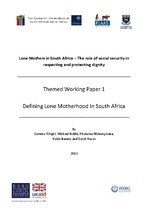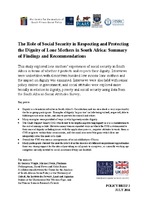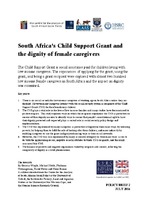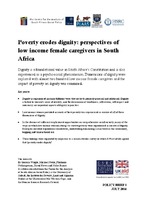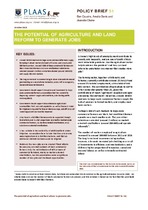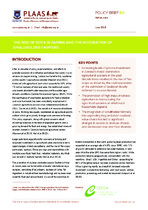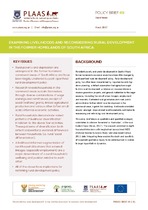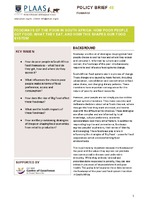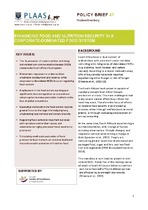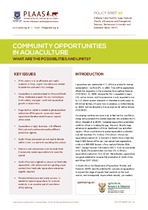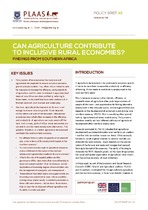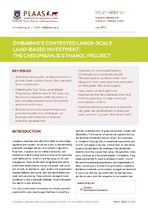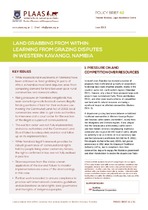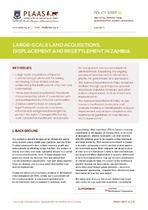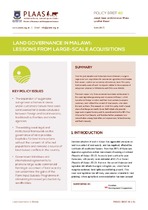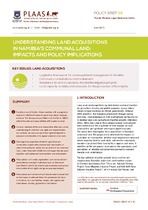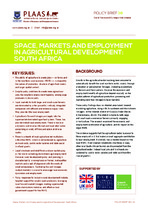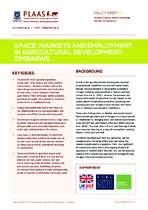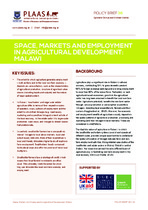Policy Briefs: Recent submissions
Now showing items 81-100 of 144
-
Lone Mothers in South Africa - The role of social security in respecting and protecting dignity.
(Institute for Poverty, Land and Agrarian Studies, University of the Western Cape, 2013)The purpose of this document is to define the group of people whom we are considering as part of the project ‘Lone Mothers in South Africa: The role of social security in respecting and protecting dignity’. Setting to ... -
Lone Mothers in South Africa - The role of social security in respecting and protecting dignity.
(Institute for Poverty, Land and Agrarian Studies, University of the Western Cape, 2013)The purpose of this document is to define the group of people whom we are considering as part of the project ‘Lone Mothers in South Africa: The role of social security in respecting and protecting dignity’. Setting to ... -
The role of social security in respecting and protecting the dignity of lone mothers in South Africa: Summary of findings and recommendations
(Institute for Poverty, Land and Agrarian Studies, University of the Western Cape, 2014)This study explored lone mothers’ experiences of social security in South Africa in terms of whether it protects and respects their dignity. Interviews were undertaken with almost two hundred low income lone mothers ... -
South Africa’s Child Support Grant and the dignity of female caregivers
(Institute for Poverty, Land and Agrarian Studies, University of the Western Cape, 2014)The Child Support Grant (CSG) is social assistance for children with low income caregivers. It is currently paid at the rate of R310 per month and there are more than 11 million child beneficiaries. Almost all (98%) of ... -
Poverty erodes dignity: perspectives of low income female caregivers in South Africa
(Institute for Poverty, Land and Agrarian Studies, University of the Western Cape, 2014)The Universal Declaration of Human Rights introduces the recognition of the inherent dignity of all people as a foundation of freedom, justice and peace in the world. Dignity plays a prominent role in South Africa’s ... -
The potential of agriculture and land reform to generate jobs
(Institute for Poverty, Land and Agrarian Studies, University of the Western Cape, 2018)Extremely high levels of unemployment contribute to poverty and inequality, and are one of South Africa’s most intractable problems. Can the agricultural sector help to address the problem? And how can land reform be ... -
The rise of Soya in Zambia and the integration of smallholder farmers
(Institute for Poverty, Land and Agrarian Studies, University of the Western Cape, 2018)After six decades of policy experimentation, and efforts to promote economic diversification and reduce the country’s over-reliance on copper mining, Zambia has failed to fully capitalise on the country’s agricultural ... -
Examining livelihoods and reconsidering rural development in the former homelands of South Africa
(Institute for Poverty, Land and Agrarian Studies, University of the Western Cape, 2017)Persistent poverty and under-development in South Africa’s former homeland communal areas have been little changed by post-apartheid ‘rural development’ policy. Rural development policy has often been characterised by ... -
Foodways of the poor in South Africa: How poor people get food, what they eat, and how this shapes our food system
(Institute for Poverty, Land and Agrarian Studies, University of the Western Cape, 2017)Foodways are the set of strategies shaping what food people choose as well as how and where they access and consume it. Informed by culture and social context, the foodways of the poor simultaneously respond to and ... -
Enhancing food and nutrition security in a corporate-dominated food system
(Institute for Poverty, Land and Agrarian Studies, University of the Western Cape, 2017)South Africa faces a ‘dual burden’ of malnutrition, with persistent under-nutrition coinciding with rising rates of diet-related NCDs (e.g. diabetes, heart disease, and certain cancers). According to a recent national ... -
Community opportunities in aquaculture, What are the possibilities and limits?
(Institute for Poverty, Land and Agrarian Studies, University of the Western Cape, 2016)Aquaculture now contributes 47% of fish available for human consumption – up from 9% in 1980. This shift to aquaculture offsets the stagnation in the production from capture fisheries (FAO 2012). By 2030, demand for ... -
Can agriculture contribute to inclusive rural economies?
(Institute for Poverty, Land and Agrarian Studies, University of the Western Cape, 2015)If agricultural development is to contribute to economic growth, it has to do more than increase the productivity or efficiency of farming. It also needs to contribute to employment in the rural non-farm sector. This ... -
Zimbabwe’s contested large-scale land-based investment: The chisumbanje ethanol project
(Institute for Poverty, Land and Agrarian Studies, University of the Western Cape, 2015)Zimbabwe’s fast-track land reform from 2000 onward yielded significant land transfers, but led the country to face debilitating production challenges and lack of investment in agriculture. Since then, Zimbabwe has not ... -
Land grabbing from within: Learning from grazing disputes in Western Kavango, Namibia.
(Institute for Poverty, Land and Agrarian Studies, University of the Western Cape, 2015)In recent years Namibia has received a number of proposals from multinational agricultural corporations to develop large-scale irrigation projects, mainly in the country’s water-rich, north-eastern regions (Odendaal 2011). ... -
Large-scale land acquisitions, displacement and resettlement in Zambia
(Institute for Poverty, Land and Agrarian Studies, University of the Western Cape, 2015)The increase in demand for land can be attributed in part to rising incomes among middle-class Zambians, but also to the Zambian government’s drive to boost economic growth and reduce poverty by attracting foreign ... -
Land governance in Malawi: Lessons from large-scale acquisitions
(Institute for Poverty, Land and Agrarian Studies, University of the Western Cape, 2015)Over the past decade rural Malawians have witnessed a surge in large-scale land acquisitions for commercial agriculture that threaten their access, control and ownership of customary land. This policy brief presents ... -
Understanding land acquisitions in Namibia’s communal land: Impacts and policy implications
(Institute for Poverty, Land and Agrarian Studies, University of the Western Cape, 2015)Large-scale land acquisitions by both foreign and local investors for agriculture, forestry and wildlife purposes, among others, remain a major challenge for African governments. Between 2000 and 2011, the Namibian ... -
Space, markets and employment in agricultural development: South Africa
(Institute for Poverty, Land and Agrarian Studies, University of the Western Cape, 2015)Growth in the agricultural sector has long been assumed to automatically benefit the rural non-farm sector, mainly through production or consumption ‘linkages’, including expenditure by farmers and their workers. However ... -
Space, markets and employment in agricultural development: Zimbabwe
(Institute for Poverty, Land and Agrarian Studies, University of the Western Cape, 2015)Growth in the agricultural sector has long been assumed to automatically benefit the rural non-farm sector, chiefly through various production or consumption expenditure ‘linkages’ including local expenditure by farmers ... -
Space, markets and employment in agricultural development: Malawi
(Institute for Poverty, Land and Agrarian Studies, University of the Western Cape, 2015)Agriculture plays a significant role in Malawi’s national economy, contributing 35% to gross domestic product, 90% to foreign exchange earnings and providing employment to more than 80% of the labour force. Particularly ...

